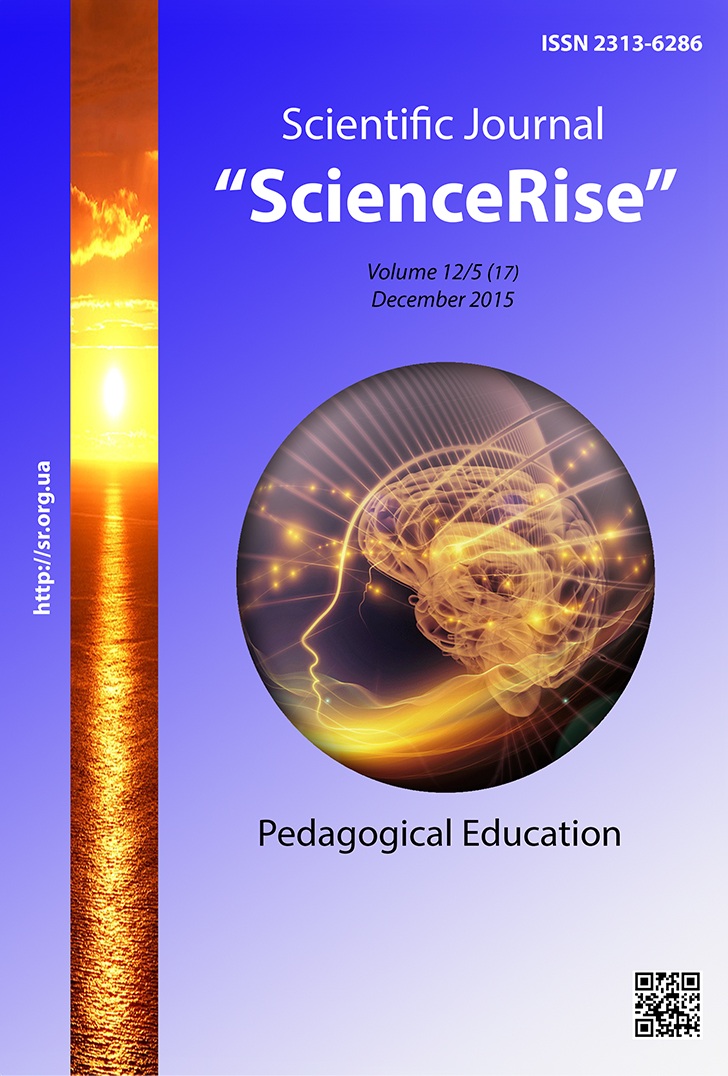Philosophic-literary reading ability aspects of pupils
DOI:
https://doi.org/10.15587/2313-8416.2015.57180Keywords:
philosophical and literary ideas, students with low achievement, corrective study literatureAbstract
In the article the philosophical and literary factors organizations cognitive process of students with low literary development. It was found significant discrepancies in the interpretation of the essence of scholars teaching and remedial work philologist. Thanks to synergetic methodology defined implementation strategy and targeted development of personal potential of students through art word by mastering fundamental intellectual, moral and aesthetic cultural values
References
Sytchenko, A. (2004). Education technology concept literary analysis. Kyiv. Lenvit, 304.
Lutay, V. (1996). Philosophy of modern education: teach. guidances. Kyiv: Center «Master-S» Creative Union of Teachers Ukraine, 256.
Sytchenko, A., Shulyar, V., Gladyshev, V.; Sytchenko, A. (Ed.) (2008). Teaching method References terminological dictionary. Kyiv: John Jure, 132.
Skovoroda, G. (1961). Writings. In 2 volumes. Vol. 1. Publisher USSR, 350.
The program for secondary schools (2005). Ukrainian literature. 5–12 classes. Perun, 201.
Jurkiewicz, Pamphil (2000). History of philosophy of law. Kind. 2nd edition. «Ukrainian World», 756.
Lazarev, F. (2000). Reason for the new century: global reorientation. Simferopol: Sonata, 88.
Jaspers, K. (1991). Spiritual situation TIME. Moscow: Politizdat, 288–418.
Bilous, O. (2001). Ukrainian upgrade path in the XXI century. Kyiv an antiquity, 6, 20–30.
Pasichnyk, E. (2000). Methods of teaching Ukrainian literature in secondary schools: textbook for students of higher educational institutions. Lenvit, 384.
Hyrshman, M. (1991). Literary Works: Theory and Practice analysis. Moscow: Higher School, 160.
Hrom'yak, R., Kuznetsov, Y. et. al. (1997). Literary Dictionary Directory. Academy, 752.
Prozorov, V. (1985). Author and reader orientation of art. The problem of the author in fiction: Interuniversity collection of scientific papers. Ustinov, 27–32.
Galich, Alexander (2001). Literary Theory: a textbook. Kyiv: Lybid, 488.
Potebnya, A. (2001). Thought and language (fragments). Anthology of World literary-critical thought twentieth century. Lviv: Chronicle, 34–52.
Nayenko, M. (1997). Ukrainian literary schools, trends. Academy, 320.
Myropolska, N. (2002). Word Art in the structure of student artistic culture. Theory and parliamentary publishing house, 204.
Mark, V. (2003). Fundamentals analysis of literary works. Kirovograd: RVTS KSPU them. Vynnychenka B., 32.
Schelling, F. (1966). Philosophy of Art. Moscow: Thought, 496.
Descartes R. (1989). Basic rules of method. Sokolov V. Works. In 2 volumes. Vol. 1. Moscow: Thought, 256–262.
Ylychev, L., Fedoseev, P., Kovalev, S., Panov, V. (Eds.) (1983). Philosophical Encyclopedic Dictionary. Moscow: Sov. Encyclopedia, 840.
Bakhtin, M. (2001). Problem text in linguistics, philology and other humanities. Anthology of World literary-critical thought twentieth century. Lviv: Chronicle, 416–422.
Gershunsky, B. (2002). Philosophy of education for XXI century: Textbook. Moscow: Russia Pedahohycheskoe Society, 512.
Barth, R. (2001). From the text of a work Anthology of World literary-critical thought twentieth century. Lviv: Chronicle, 491–496.
Tokman, G. (2003). Developmental Psychology as a source of scientific literature teaching methodology, 6, 23–29.
Downloads
Published
Issue
Section
License
Copyright (c) 2015 Ольга Дмитрівна Мхитарян

This work is licensed under a Creative Commons Attribution 4.0 International License.
Our journal abides by the Creative Commons CC BY copyright rights and permissions for open access journals.
Authors, who are published in this journal, agree to the following conditions:
1. The authors reserve the right to authorship of the work and pass the first publication right of this work to the journal under the terms of a Creative Commons CC BY, which allows others to freely distribute the published research with the obligatory reference to the authors of the original work and the first publication of the work in this journal.
2. The authors have the right to conclude separate supplement agreements that relate to non-exclusive work distribution in the form in which it has been published by the journal (for example, to upload the work to the online storage of the journal or publish it as part of a monograph), provided that the reference to the first publication of the work in this journal is included.

